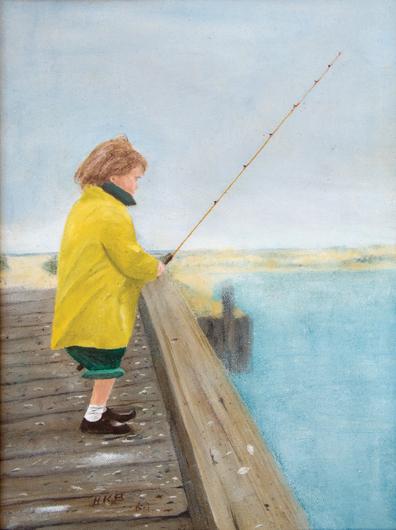It is understandable that Poucha Pond has been linked with Senator Ted Kennedy’s infamous accident at the Dike Bridge in 1969, and that this notoriety has often overshadowed the fact that it is a place of great natural beauty and a hidden gem in the Vineyard’s hierarchy
of magical fishing spots. Unless, of course, you are an angler. Then you immediately sense that Poucha is something special.
Lying at the southern end of Chappaquiddick’s inland waterway (which includes the Gut, Cape Pogue Pond, and the Narrows), Poucha was historically a freshwater pond, sealed by a dike that included sluiceways and a herring run. Here’s how it was in a recollection by Robert B. Marshall published in 1981 in the book Chappaquiddick, That Sometimes
Separated But Never Equalled Island:

“It was around 1945 when I pulled a herring net across the front side of the dike and caught about forty barrels of herring….On one of the last times I went crabbing before the dike was breached, my friend Roland Studley and I caught enough crabs to fill three bushel bags. None of them less than twenty-two inches from claw to claw. One of them measured thirty-two inches. An eel pot baited with fresh white bait and left overnight in Poucha Pond yielded thirty-two eels…At any time white, yellow, and black perch were available. Because the water was fairly brackish, wild rice and celery grew abundantly and they attracted ducks and geese. I have seen thousands of ducks and geese in the pond at one time.”
In 1950, despite considerable opposition, the town breached the dike and replaced it with a bridge in a failed effort to establish bay scallops in Poucha. The salt water went into the fresh, and the ducks and geese and the food that they ate all disappeared, yet the salt content was insufficient to grow scallops.
“Ever since they opened it up to the ocean with that bridge,” Foster Silva said in the same book, “Poucha ain’t nothing but a sump hole.”
The key words are “opened it up to the ocean.” Striped bass and bluefish can now navigate under the bridge and into the pond to feed on herring and a myriad of other baitfish.
You wouldn’t guess they are there in that small pond so far from the sea, but at times they are, and some are big. For instance, Paul Schultz, former ranger and surf casting instructor for the Trustees of Reservations, once caught a thirty-one pound striped bass in Poucha, as well as a nine-pound bluefish that won a weekly prize in the derby.
My daughter Emily is fishing from the old Dike Bridge in this oil sketch I made in 1962.
We caught bass up to fifteen pounds there.



 1 comment
1 comment
Comments (1)